Born in London, Chesterton was educated at St. Paul's, but never went to college. He went to art school. In 1900, he was asked to contribute a few magazine articles on art criticism, and went on to become one of the most prolific writers of all time. He wrote a hundred books, contributions to 200 more, hundreds of poems, including the epic Ballad of the White Horse, five plays, five novels, and some two hundred short stories, including a popular series featuring the priest-detective, Father Brown. In spite of his literary accomplishments, he considered himself primarily a journalist. He wrote over 4000 newspaper essays, including 30 years worth of weekly columns for the Illustrated London News, and 13 years of weekly columns for the Daily News. He also edited his own newspaper, G.K.'s Weekly. (To put it into perspective, four thousand essays is the equivalent of writing an essay a day, every day, for 11 years. If you're not impressed, try it some time. But they have to be good essays, all of them, as funny as they are serious, and as readable and rewarding a century after you've written them.) Chesterton was equally at ease with literary and social criticism, history, politics, economics, philosophy, and theology. His style is unmistakable, always marked by humility, consistency, paradox, wit, and wonder. His writing remains as timely and as timeless today as when it first appeared, even though much of it was published in throw away paper. This man who composed such profound and perfect lines as "The Christian ideal has not been tried and found wanting; it has been found difficult and left untried," stood 6'4" and weighed about 300 pounds, usually had a cigar in his mouth, and walked around wearing a cape and a crumpled hat, tiny glasses pinched to the end of his nose, swordstick in hand, laughter blowing through his moustache. And usually had no idea where or when his next appointment was. He did much of his writing in train stations, since he usually missed the train he was supposed to catch. In one famous anecdote, he wired his wife, saying, "Am at Market Harborough. Where ought I to be?" His faithful wife, Frances, attended to all the details of his life, since he continually proved he had no way of doing it himself. She was later assisted by a secretary, Dorothy Collins, who became the couple's surrogate daughter, and went on to become the writer's literary executrix, continuing to make his work available after his death. This absent-minded, overgrown elf of a man, who laughed at his own jokes and amused children at birthday parties by catching buns in his mouth, was the man who wrote a book called The Everlasting Man, which led a young atheist named C.S. Lewis to become a Christian. This was the man who wrote a novel called The Napoleon of Notting Hill, which inspired Michael Collins to lead a movement for Irish Independence. This was the man who wrote an essay in the Illustrated London News that inspired Mahatma Gandhi to lead a movement to end British colonial rule in India. This was a man who, when commissioned to write a book on St. Thomas Aquinas (aptly titled Saint Thomas Aquinas), had his secretary check out a stack of books on St.

Il segreto di Padre Brown
G. K. Chesterton
audiobook
World's Greatest Classics in One Volume : Les Misérables, Hamlet, Jane Eyre, Ulysses, War and Peace, Art of War, Faust, Don Quixote, Bushido…
Johann Wolfgang von Goethe, Stendhal, Jules Verne, Gustave Flaubert, Lewis Carroll, Henrik Ibsen, Charles Dickens, Plato, Honoré de Balzac, Mark Twain, Harriet Beecher Stowe, Rabindranath Tagore, Fyodor Dostoyevsky, Walt Whitman, Niccolò Machiavelli, Oscar Wilde, Robert Louis Stevenson, James Fenimore Cooper, Edgar Allan Poe, William Shakespeare, Giovanni Boccaccio, Confucius, George MacDonald, Bram Stoker, Charlotte Brontë, Emily Brontë, Henry David Thoreau, Weedon Grossmith, Jack London, Henry James, Louisa May Alcott, Victor Hugo, Arthur Conan Doyle, Frances Hodgson Burnett, Joseph Conrad, Jane Austen, Herman Melville, George Eliot, Laurence Sterne, Thomas Hardy, Jonathan Swift, Edith Wharton, Benito Pérez Galdós, Daniel Defoe, Henry Fielding, Alexandre Dumas, Kalidasa, Kenneth Grahame, Marcel Proust, Willa Cather, Nathaniel Hawthorne, Homer, Gaston Leroux, Charles Baudelaire, Wilkie Collins, William Makepeace Thackeray, Voltaire, Kate Chopin, Apuleius, John Milton, Frederick Douglass, Laozi, John Keats, James Joyce, Ann Ward Radcliffe, Kahlil Gibran, Kakuzo Okakura, Soseki Natsume, Princess Der Ling, H. G. Wells, W. B. Yeats, J. M. Barrie, G. K. Chesterton, T. S. Eliot, L. M. Montgomery, C. S. Lewis, D. H. Lawrence, E. M. Forster, H. P. Lovecraft, Marcus Aurelius, Friedrich Nietzsche, Lewis Wallace, Ivan Turgenev, Anton Chekhov, Leo Tolstoy, Nikolai Gogol, Sir, George Bernard Shaw, Miguel de Cervantes, Mary Shelley, Cao Xueqin, Emile Zola, Válmíki, Bankim Chandra Chatterjee, P. B. Shelley, Elizabeth von Arnim, Herman Hesse, Dante, Pedro Calderon de la Barca, Sun Tzu, Inazo Nitobé
book
Religious Classics - Boxed Set : 30+ Religious Themed Classics: The Screwtape Letters, Faust, Divine Comedy, Satan's Diary, Ben-Hur…
Johann Wolfgang von Goethe, Gustave Flaubert, Mark Twain, Henryk Sienkiewicz, Dante Alighieri, George MacDonald, Anatole France, Henry Van Dyke, Robert Hugh Benson, Arthur Christopher Benson, Leonid Andreyev, John Bunyan, Eden Phillpotts, Grace Livingston Hill, Voltaire, Paul Laurence Dunbar, Elizabeth Miller, Lew Wallace, John Milton, Charles M. Sheldon, Marie orelli, John Henry Newman, G. K. Chesterton, C. S. Lewis, Friedrich Nietzsche, Anton Chekhov, Leo Tolstoy, Fyodor Dostoevsky, Prentice Mulford
book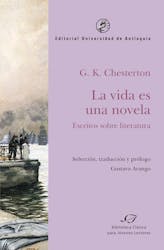
La vida es una novela : Escritos sobre literatura
G. K. Chesterton
book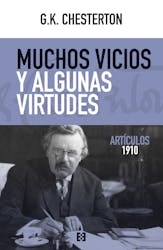
Muchos vicios y algunas virtudes : Artículos 1910
G. K. Chesterton
book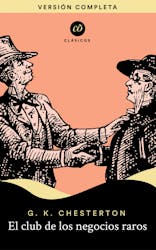
El club de los negocios raros
G. K. Chesterton
book
Summertime Reading List: 180 Books You Need to Read (Vol.II) : Life is a Dream, The Awakening, Babbitt, Strange Case of Dr Jekyll and Mr Hyde, Sense and Sensibility, ... Hunchback of Notre Dame, Iliad & Odyssey...
Robert Louis Stevenson, Henrik Ibsen, Charles Dickens, Leo Tolstoy, Ford Madox Ford, E. M. Forster, Honoré de Balzac, Jane Austen, L. M. Montgomery, Kenneth Grahame, Rabindranath Tagore, George and Weedon Grossmith, F. Scott Fitzgerald, Daniel Defoe, Jules Verne, Jonathan Swift, James Fenimore Cooper, George MacDonald, J. M. Barrie, Alexandre Dumas, Homer, Dante, William Dean Howells, Kakuzo Okakura, Gustave Flaubert, Victor Hugo, Stendhal, Sir Walter Scott, Anthony Trollope, Emile Zola, Theodor Storm, Harriet Beecher Stowe, Nathaniel Hawthorne, Henry Fielding, Jerome K. Jerome, Laurence Sterne, Thomas Hardy, Willa Cather, Edith Wharton, Kate Chopin, Sinclair Lewis, W. Somerset Maugham, Henry James, Ivan Turgenev, Nikolai Gogol, Virginia Woolf, Anonymous, Pedro Calderon de la Barca, Johann Wolfgang von Goethe, Friedrich Nietzsche, Benjamin Franklin, Bankim Chandra Chatterjee, Kalidasa, Válmíki, Edgar Allan Poe, Wilkie Collins, Ann Ward Radcliffe, Bram Stoker, Gaston Leroux, H. G. Wells, Joseph Conrad, Lewis Wallace, Washington Irving, Machiavelli, Fyodor Dostoyevsky, Confucius, Laozi, John Milton, P. B. Shelley, W. B. Yeats, Charlotte Perkins Gilman, D.H. Lawrence, George Bernard Shaw, Elizabeth von Arnim, Cao Xueqin, G. K. Chesterton, John Buchan, Edgar Wallace, Nikolai Leskov, Kurt Vonnegut, William Walker Atkinson, Émile Coué
book
The Ultimate Summer Read Collection : 150 Everlasting Masterpieces of the World Literature
Jane Austen, C. S. Lewis, H. G. Wells, Herman Melville, William Shakespeare, John Milton, Jonathan Swift, Daniel Defoe, Henry Fielding, Laurence Sterne, William Makepeace Thackeray, P. B. Shelley, Mary Shelley, John Keats, Charlotte Brontë, Emily Brontë, Anne Brontë, George Eliot, Charles Dickens, Thomas Hardy, Elizabeth von Arnim, D. H. Lawrence, Ann Ward Radcliffe, Bram Stoker, Arthur Conan Doyle, Joseph Conrad, Oscar Wilde, Lewis Carroll, Frances Hodgson Burnett, George Weedon Grossmith, Willkie Collins, G. K. Chesterton, E. M. Forster, T. S. Eliot, James Joyce, George Bernard Shaw, W. B. Yeats, Sir Walter Scott, Robert Louis Stevenson, Kenneth Grahame, George MacDonald, J. M. Barrie, Mark Twain, Jack London, Nathaniel Hawthorne, Louisa May Alcott, Willa Cather, Edith Wharton, Kate Chopin, Henry David Thoreau, Walt Whitman, Kahlil Gibran, Harriet Beecher Stowe, Frederick Douglass, James Fenimore Cooper, Henry James, Edgar Allan Poe, H. P. Lovecraft, Lewis Wallace, L. M. Montgomery, Homer, Plato, Apuleius, Marcus Aurelius, Johann Wolfgang von Goethe, Herman Hesse, Friedrich Nietzsche, Jules Verne, Marcel Proust, Victor Hugo, Gustave Flaubert, Gaston Leroux, Honoré de Balzac, Stendhal, Voltaire, Charles Baudelaire, Alexandre Dumas, Emile Zola, Henrik Ibsen, Leo Tolstoy, Fyodor Dostoyevsky, Ivan Turgenev, Anton Chekhov, Nikolai Gogol, Miguel de Cervantes, Benito Pérez Galdós, Pedro Calderon de la Barca, Dante, Giovanni Boccaccio, Niccolò Machiavelli, Rabindranath Tagore, Bankim Chandra Chatterjee, Kalidasa, Válmíki, Laozi, Sun Tzu, Confucius, Cao Xueqin, Princess Der Ling, Inazo Nitobé, Kakuzo Okakura, Soseki Natsume, Charlotte Perkins Gilman, F. Scott Fitzgerald, William Dean Howells, Washington Irving, L. Frank Baum, Theodor Storm, Juan Valera, Rudyard Kipling
book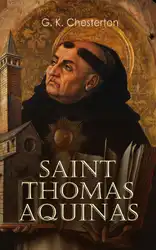
Saint Thomas Aquinas : The Biography and the Influence
G. K. Chesterton
book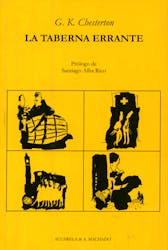
La taberna errante
G. K. Chesterton
book
Fader Brown: De flygande stjärnorna. Återutgivning av detektivnovell från 1912. Kompletterad med fakta och ordlista
G. K. Chesterton
book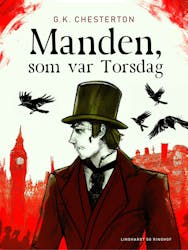
Manden, som var Torsdag
G. K. Chesterton
book
